(Original: SMILE: Supporting Mental Health in Young People: Integrated Methodology for cLinical dEcisions and evidence based interventions)
In a rapidly evolving society, psychological distress, anxiety, and depression pose significant challenges, especially for adolescents and their families. Stressors can lead to a wide range of consequences for each individual. While distress does not necessarily lead to an illness, access to timely support is not always guaranteed. Embarrassment and fear of stigmatisation, particularly among young people, prevent them from discussing their needs. Additionally, the possibilities and methods for diagnosis and treatment vary greatly within Germany, and across European borders.
The SMILE project aims to address these issues by developing the Open Knowledge Platform (OKP) that offers digital tools for children, adolescents and young people (aged from 10 to 24 years old). These AI-tools provide a gamified environment focused on mental health, that includes virtual self-assessments and self-monitoring in areas like mental stress, self-efficacy, and well-being, all integrated into gamified scenarios. Additionally, SMILE intends to develop improved practices for building resilience, enhance cognitive flexibility, learn coping skills and social competence as well as the ability of dealing with negative thoughts. The KM-EP also aims to unlock access to specific knowledge about mental stress to parents, teachers, decision-makers, and health professionals, increase awareness about the mental needs of young people. The platform will be accessible to EU citizens and will be available in multi-languages of the involved partner institutions.
In this project, we adopt (implement) a participatory approach and invite children, adolescents, young adults and their families, teachers and health professionals to contribute to the building and elaboration of the Knowledge base. The next step is the evaluation of the platform and its tools, to be carried out by seven different pilot institutions including Heidelberg University Hospital. Children, adolescents, and young people will be invited to test the platform’s functionalities and features and provide feedback. Parents, teachers, decision-makers, and health professionals in turn will discuss the concept with its benefits and challenges.
To achieve the mentioned goals, technology companies, universities, and social facilities collaborate together to develop evidence-based interventions based on tailored methods and data-driven tools. These include artificial intelligence techniques, a mobile application, gamification, and voice-driven tools such as chatbots.
The Project is funded by the European Union’s Horizon Europe Research and Innovation Programme.
Start date: 01 May 2023
End date: 31 October 2026
Duration: 42 months
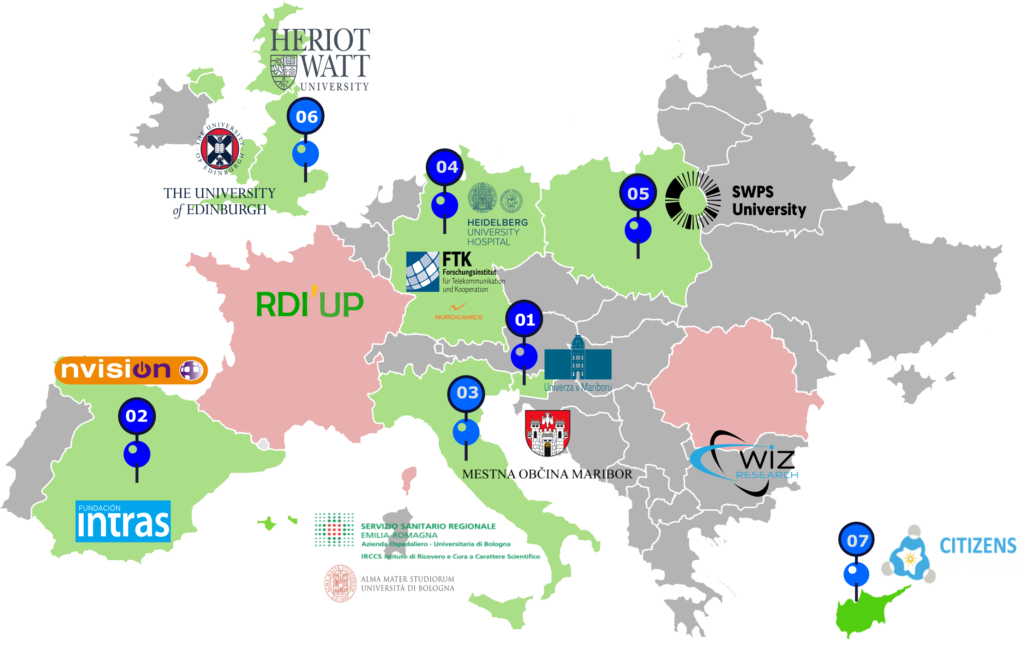
Study Information for Parents
About SMILE
Thank you for your interest in the SMILE Project! We hope to create and test a digital game and companion app that can improve young people’s mental health and resilience.
A serious game is an intervention with gaming elements added in to help players achieve goals related to their mental health. Find out more about the SMILE game below!
The SMILE Project is an EU-funded project which finishes in October 2026. So far, we have hosted focus groups and workshops with young people as well as parents, teachers, and clinicians, to find out about what issues young people are facing today and how a serious game might solve them! Now, we have created an initial version of a serious game and companion app, and we need feedback from young people and those important in their lives, to help develop and refine the tools further.

About the SMILE Tools
The Game
The SMILE game is set in Hopetown, a cyberpunk city where citizens used to live in harmony with cyber-creatures called pixlings. However, recently, pixlings have turned harmful towards Hopetown citizens.
The objective is to find out more about the pixlings and how to stop them harming the people of Hopetown. Along the way, the player will pick up some psychology-based skills to help fight back against the rogue pixlings in their mission to save Hopetown.
The player will cover activities such as breathing exercises, understanding how their thoughts can influence how they feel and behave, managing uncomfortable social situations, and puzzles to develop critical thinking skills, all to build resilience and improve their mental well-being. Find some examples of the game below!


The Companion App
The Companion App is another digital tool created by SMILE researchers, to help us understand more about players’ moods, wellbeing, and gameplay.
The Companion App has a few different features. Firstly, your child can complete some questionnaires related to their mental health and wellbeing. We have two types of questionnaires:
- Validated Measures: Patient Health Questionnaire-9 and the Generalised Anxiety Disorder Questionnaire (both adapted for children and adolescents). These are tools commonly used in the NHS and have shown to be accurate and effective at capturing mood and wellbeing (Kroenke et al., 2001; Lowe et al., 2008)
- Experience Sampling Method (ESM): ESMs are shorter, snapshot-like questions designed to understand your child’s mood in the moment. They will be asked these shorter questions five times a day.

If your child has been assigned to receive feedback on their gameplay (your local research team will let you know this in advance!) then they’ll find interactive, reflective exercises about how they did in the game. They’ll also see information about their mood and wellbeing, to understand how their game performance may be linked to their mood.
Lastly, we’ll also collect optional diary recordings from your child. This is a novel data collection technique that allows your child to tell us about themselves and share their experiences of the SMILE apps through a faux video-chat with Lumi, our friendly robot which guides them through the process.
The videos recorded in the app are never seen by a researcher, instead, we have a system which extrapolates useful data (e.g., facial expressions) for our team to analyse without ever seeing anyone’s face.
Participation Timeline
A detailed description of the study’s timeline and requirements for participants is below. Over the course of the study, participants will spend about a total of 4 hours testing out the SMILE apps.
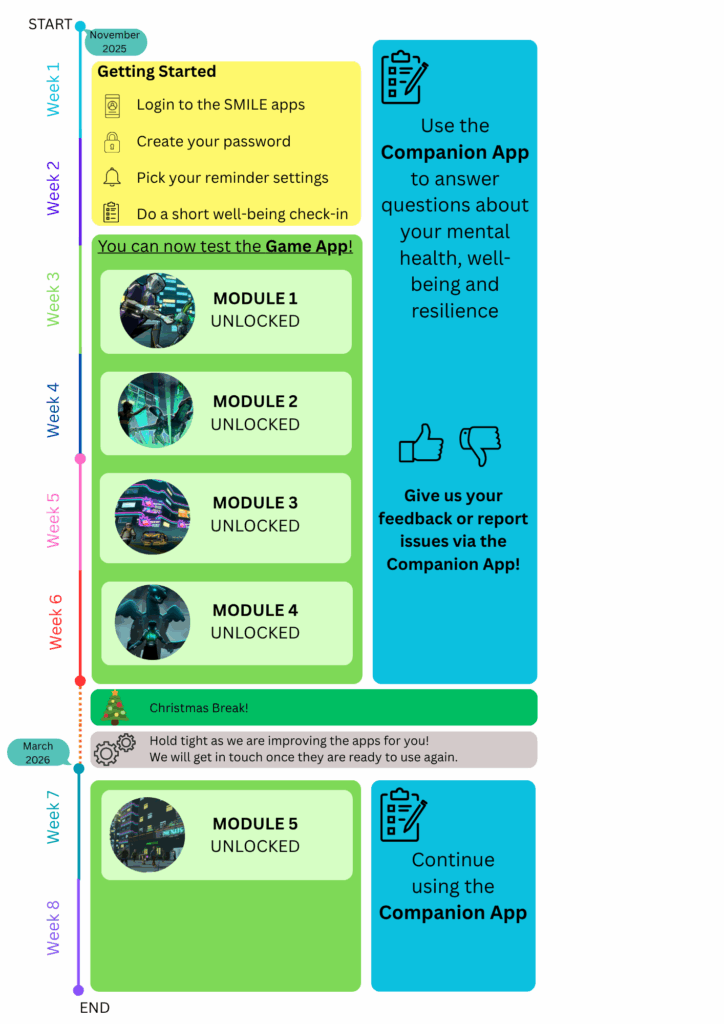
Protecting Your Child’s Data

FAQs
Do the apps provide therapy?
The apps are built on Cognitive Behavioural Therapy, but they are not diagnostic tools or a formalised therapeutic intervention. Our aim is to teach practical coping skills grounded in evidence-backed, NHS-approved therapy.
Will the apps upset my child?
We don’t expect the tools to cause any distress, and no mature content is included. However, we provide mental health resources and monitor your child’s safety using an Adverse Events Monitoring Protocol – a process for making sure the study is running securely and without any harm to your child.
Do I have to do anything?
No! The study is designed to fit around your child’s (and the school’s) schedule. We may invite you for an interview about your child’s experiences, but this is not compulsory. You may wish to monitor your child’s screen time or change their notification preferences.
Can I change my mind about my child’s participation?
Yes! You or your child have the right to withdraw from the study at any time and for any reason. You don’t need to tell us why, but we might ask you in case it is something we can improve on.
Contacts and Resources
Got a question? Contact your local research team at the email addresses below.
Heriot-Watt University
The University of Edinburgh
Mental Health Resources

For non-emergency matters, you can also contact out-of-hours services that are open 24/7:
- Childline – call 0800 1111
- If you are 18 and under, ChildLine offers information, advice and confidential counselling on any issue affecting you.
- You can also access their website – www.childline.org.uk – to access their webchat service.
- Shout – text 85258
- Shout provides free, 24/7 text support for young people across the UK experiencing a mental health crisis.
- All texts are answered by trained volunteers, with support from experienced clinical supervisors.
- Papyrus– call 0800 068 4141
- Offers confidential advice and support if you’re struggling with suicidal thoughts, and information about how to make a safety plan.
Study Information for Participants
About SMILE
Thank you for your interest in the SMILE Project! We hope to create and test a digital game and companion app that can improve young people’s mental health and resilience.
A serious game is an intervention with gaming elements added in to help players achieve goals related to their mental health – find out more about the SMILE game below!
The SMILE Project is an EU-funded project which finishes in October 2026. So far, we have hosted focus groups and workshops with young people as well as parents, teachers, and clinicians, to find out about what issues young people are facing today and how a serious game might solve them! Now, we have created an initial version of a serious game and companion app, and we need feedback from young people and those important in their lives, to help develop and refine the tools further.

About the SMILE Tools
The Game
The SMILE game is set in Hopetown, a cyberpunk city where citizens used to live in harmony with cyber-creatures called pixlings. However, recently, pixlings have turned harmful towards Hopetown citizens.
Your objective is to find out more about the pixlings and how to stop them harming the people of Hopetown. Along the way, you will pick up some psychology-based skills to help fight back against the rogue pixlings in their mission to save Hopetown.
You will cover activities such as breathing exercises, understanding how your thoughts can influence how you feel and behave, managing uncomfortable social situations, and puzzles to develop critical thinking skills, all to build resilience and improve your mental well-being. Find some examples of the game below!


The Companion App
The Companion App is another digital tool created by SMILE researchers, to help us understand more about players’ moods, wellbeing, and gameplay.
In the Companion App, you’ll come across a few different features. Firstly, you can complete some questionnaires related to your mental health and wellbeing. We have two types of questionnaires:
- Validated Measures: Patient Health Questionnaire-9 and the Generalised Anxiety Disorder Questionnaire (both adapted for children and adolescents). These are tools commonly used in the NHS and have shown to be accurate and effective at capturing mood and wellbeing (Kroenke et al., 2001; Lowe et al., 2008).
- Experience Sampling Method (ESM): ESMs are shorter, snapshot-like questions designed to understand your mood in the moment. We will ask you these shorter questions five times a day.

If you have been assigned to receive feedback on your gameplay (your local research team will let you know this in advance) then you’ll find interactive, reflective exercises about how you did in the game. You’ll also see information about your mood and wellbeing.
Lastly, we’ll collect optional video diary recordings from you. This is a novel data collection technique that allows you to tell us about yourself and share your experiences of the SMILE apps through a faux video-chat with Lumi, our friendly robot which guides you through the process.
The videos recorded in the app are never seen by a researcher, instead, we have a system which extrapolates useful data (e.g., facial expressions) for our team to analyse without ever seeing anyone’s face.
Using the Apps
Below is a reminder of how to download the applications, log in, and changing your notification preferences. If you experience any difficulties, please contact your local research team.
Downloading the Apps
Both the game and Companion App are available to download from this link: https://www.horizonsmile.eu/apps/
If your device has screen time restrictions or parental controls enabled, please ensure that both apps are excluded from them.
Logging In
Please log into the Companion App first. After you log in for the first time, you will be asked to set your own password. Once you change it to your own password, the default password we gave will no longer work. You can then use your username and the password you chose to log into the Game App.


Changing Notification Preferences
- Click on the Profile tab in the bottom right corner of the screen.
- Click the Settings sign in the top right corner.
- Go to „Notifications“.
- Adjust your Wake-up time/Bedtime and/or change your Busy times.
- Press „Save“ on the bottom of the screen.
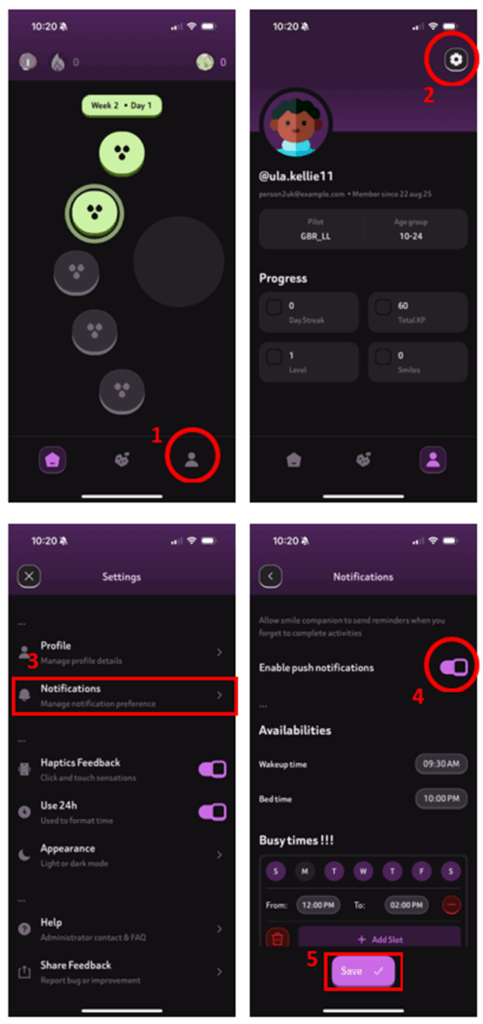
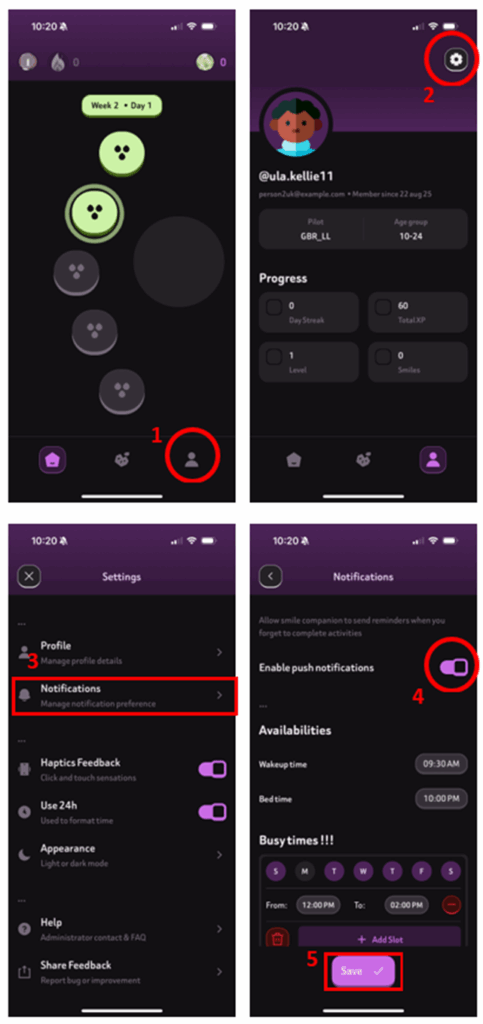

Participation Timeline
A detailed description of the study’s timeline and requirements for participants is below. Over the course of the study, participants will spend about a total of 4 hours testing out the SMILE apps.
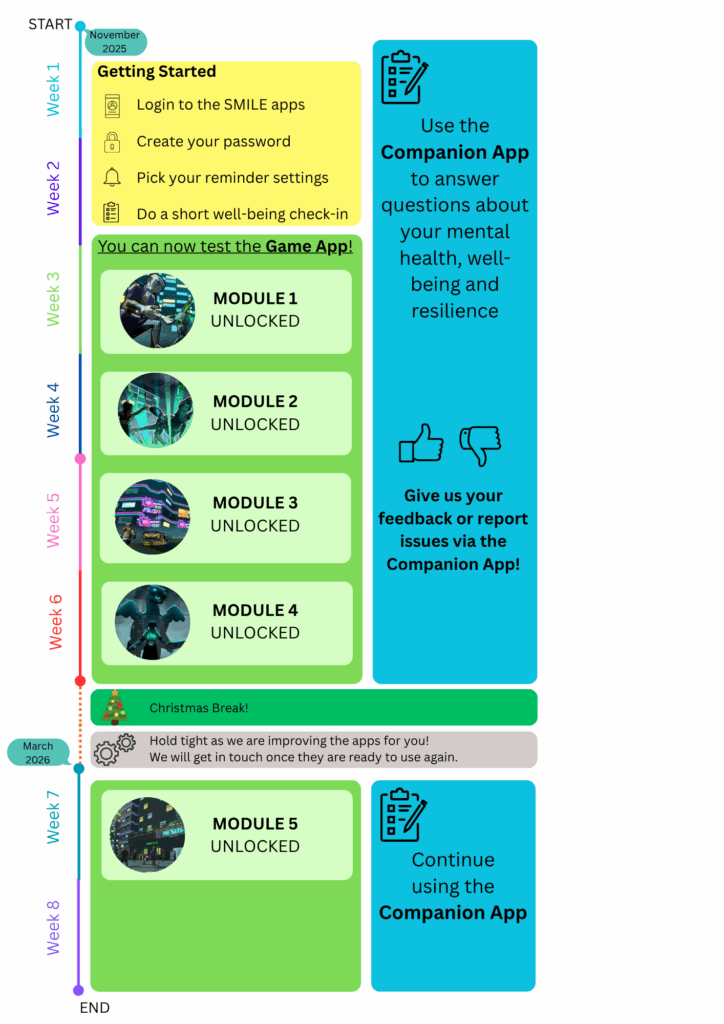
Protecting Your Data

FAQs
Do the apps provide therapy?
The apps are built on Cognitive Behavioural Therapy, but they are not diagnostic tools or a therapeutic intervention. Our aim is to teach practical skills grounded in evidence-backed therapy.
Will the apps upset me?
We don’t expect the tools to cause any distress, and no mature content is included. However, we provide mental health resources and monitor your safety using an Adverse Events Monitoring Protocol – a process for making sure the study is running securely and without any harm to you.
I have a problem with the apps, what should I do?
If you experience any issues throughout the study (for example, you forget your password or the apps crash), you can contact your local research team. See our contact details in the ‘Contacts and Resources’ section below.
Can I change my mind about taking part?
Yes! You have the right to withdraw from the study at any time and for any reason. You don’t need to tell us why, but we might ask you in case it is something we can improve on.
Contacts and Resources
Got a question? Contact your local research team at the email addresses below.
Heriot-Watt University
The University of Edinburgh
Mental Health Resources

For non-emergency matters, you can also contact out-of-hours services that are open 24/7:
- Childline – call 0800 1111
- If you are 18 and under, ChildLine offers information, advice and confidential counselling on any issue affecting you.
- You can also access their website – www.childline.org.uk – to access their webchat service.
- Shout – text 85258
- Shout provides free, 24/7 text support for young people across the UK experiencing a mental health crisis.
- All texts are answered by trained volunteers, with support from experienced clinical supervisors.
- Papyrus– call 0800 068 4141
- Offers confidential advice and support if you’re struggling with suicidal thoughts, and information about how to make a safety plan.
References
Löwe, B., Decker, O., Müller, S., Brähler, E., Schellberg, D., Herzog, W., & Herzberg, P. Y. (2008). Validation and standardization of the Generalized Anxiety Disorder Screener (GAD-7) in the general population. Medical care, 46(3), 266-274.
Kroenke, K., Spitzer, R. L., & Williams, J. B. (2001). The PHQ‐9: validity of a brief depression severity measure. Journal of general internal medicine, 16(9), 606-613.